KEY TAKEAWAYS: HIROKAZU KORE-EDA’S MASTERCLASS – THE UNIVERSAL WAVEMAKER
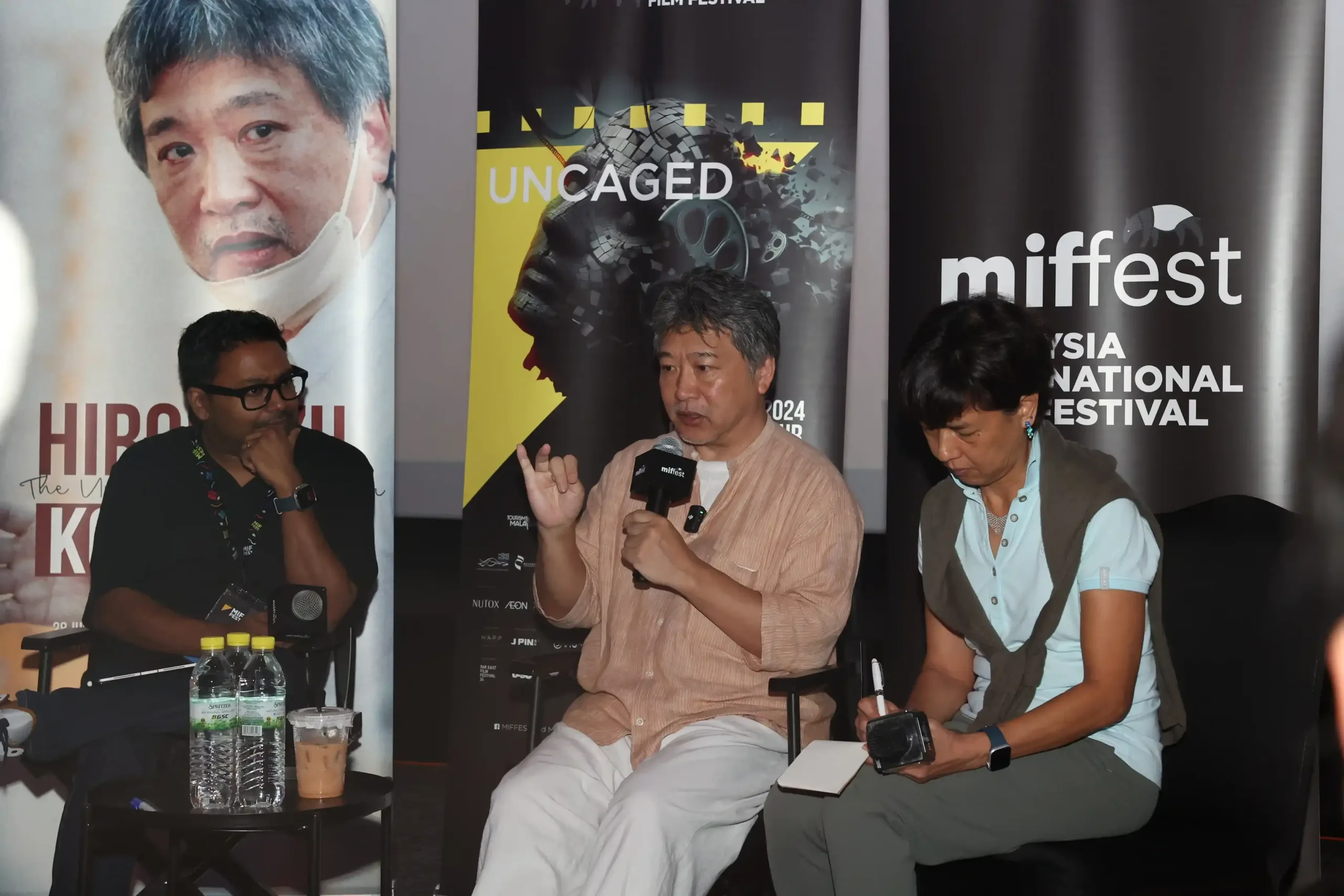
Umapagan Ampikaipakan, Hirokazu Kore-eda and his interpreter.
SPEAKER(S)
Hirokazu Kore-eda
Born in Tokyo in 1962. Originally intended to be a novelist, but after graduating from Waseda University in 1987 went on to become an assistant director at T.V. Man Union. Snuck off set to film Mou hitotsu no kyouiku – Ina shogakkou haru gumi no kiroku (1991). His first feature, Maborosi (1995), based on a Teru Miyamoto novel and drawn from his own experiences while filming Kare no inai hachigatsu ga (1994), won jury prizes at Venice and Chicago. The main themes of his oeuvre include memory, loss, death and the intersection of documentary and fictional narratives.
Hirokazu Kore-eda, one of Japan’s most revered filmmakers, has captivated audiences worldwide with his poignant exploration of family dynamics, human relationships, and the beauty found in everyday life. Kore-eda’s recent masterclass offers a rare glimpse into his creative process, his philosophy on filmmaking, and his approach to storytelling, which has garnered both critical acclaim and popular appeal across different cultural landscapes.
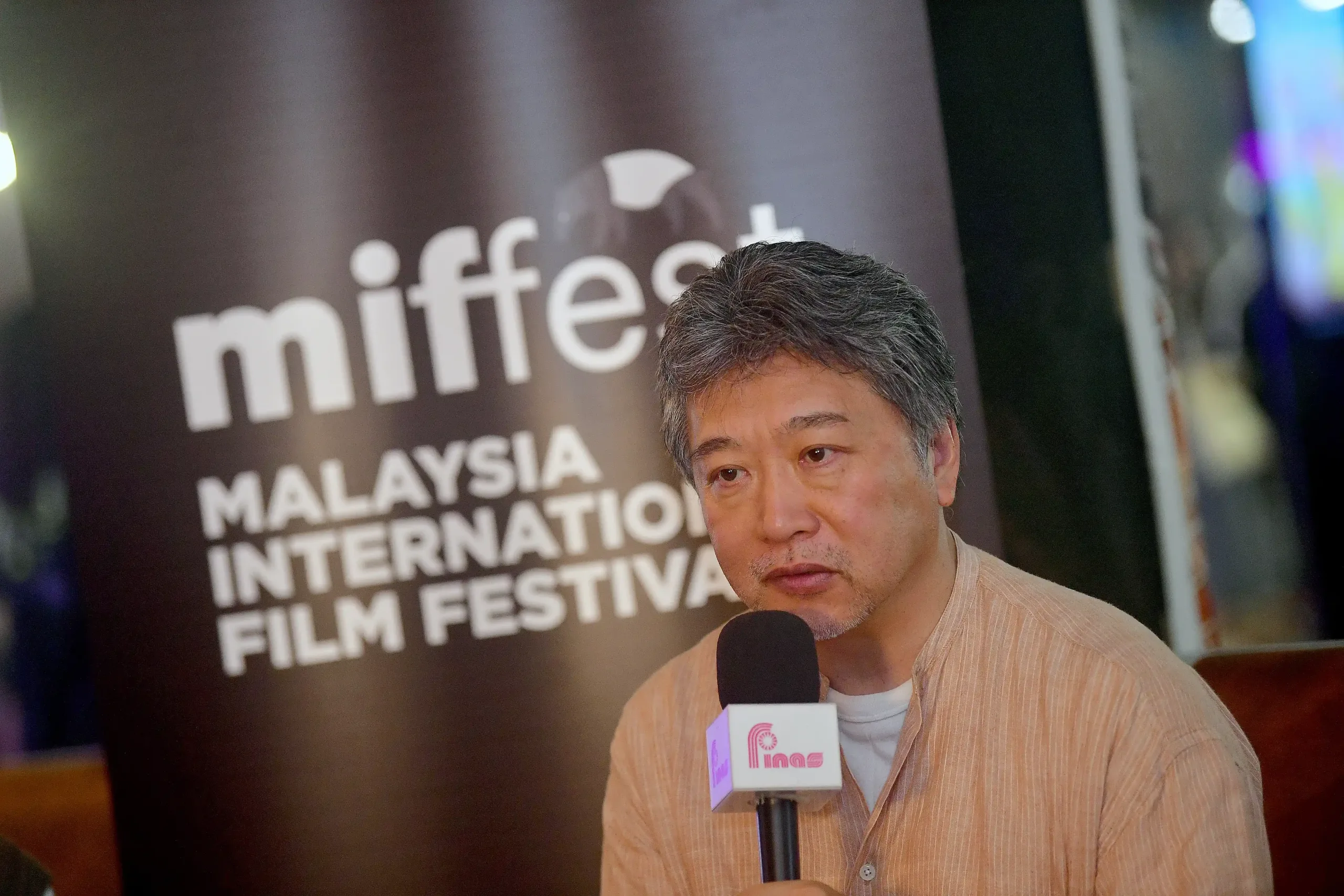
Hirokazu Kore-eda.
The Unpredictable Nature of Filmmaking
One of the most striking aspects of Kore-eda’s filmmaking is the unpredictability with which he approaches his projects. Rather than following a rigid plan, Kore-eda admits that his ideas often come together organically, influenced by circumstances and collaborators. He describes this process as something beyond his control, where “the necessary conditions” align to bring a story to life. This spontaneous approach allows his films to breathe and evolve naturally, often resulting in deeply human narratives that resonate with audiences globally.
Collaborating Across Cultures
Kore-eda’s films have transcended language barriers, as seen in his recent works like “Broker” (Korea) and “The Truth” (France). His decision to shoot in different languages and collaborate with international actors stemmed from his growing relationships with actors and producers at film festivals. Kore-eda credits actors like Juliette Binoche and Song Kang-ho for initiating these collaborations, underscoring the organic nature of his cross-cultural projects. This willingness to explore different cultural contexts has expanded Kore-eda’s cinematic reach, while maintaining his signature focus on universal human experiences.
The Visual and Emotional Impact of Music
Music plays a critical role in Kore-eda’s films, particularly in “Monster”, where he worked closely with renowned composer Ryuichi Sakamoto. Kore-eda revealed that if Sakamoto had not agreed to compose the music, he would have considered making the film without a score altogether, relying instead on natural sounds like wind and rain to create the atmosphere. This highlights Kore-eda’s meticulous attention to how music and soundscapes influence the emotional tone of his films, creating an immersive experience for viewers.
The Art of Working with Child Actors
Kore-eda has a unique gift for working with child actors, as demonstrated in films like “Nobody Knows” and “Shoplifters”. His approach is patient and adaptive, focusing on creating an environment where children can express themselves naturally. Kore-eda emphasizes the importance of taking time with child actors, acknowledging that they often tire more quickly than adults and may struggle with certain lines or emotions. His “whispering method,” where he feeds lines directly to the children during filming, has become a signature technique, allowing for more spontaneous and authentic performances.
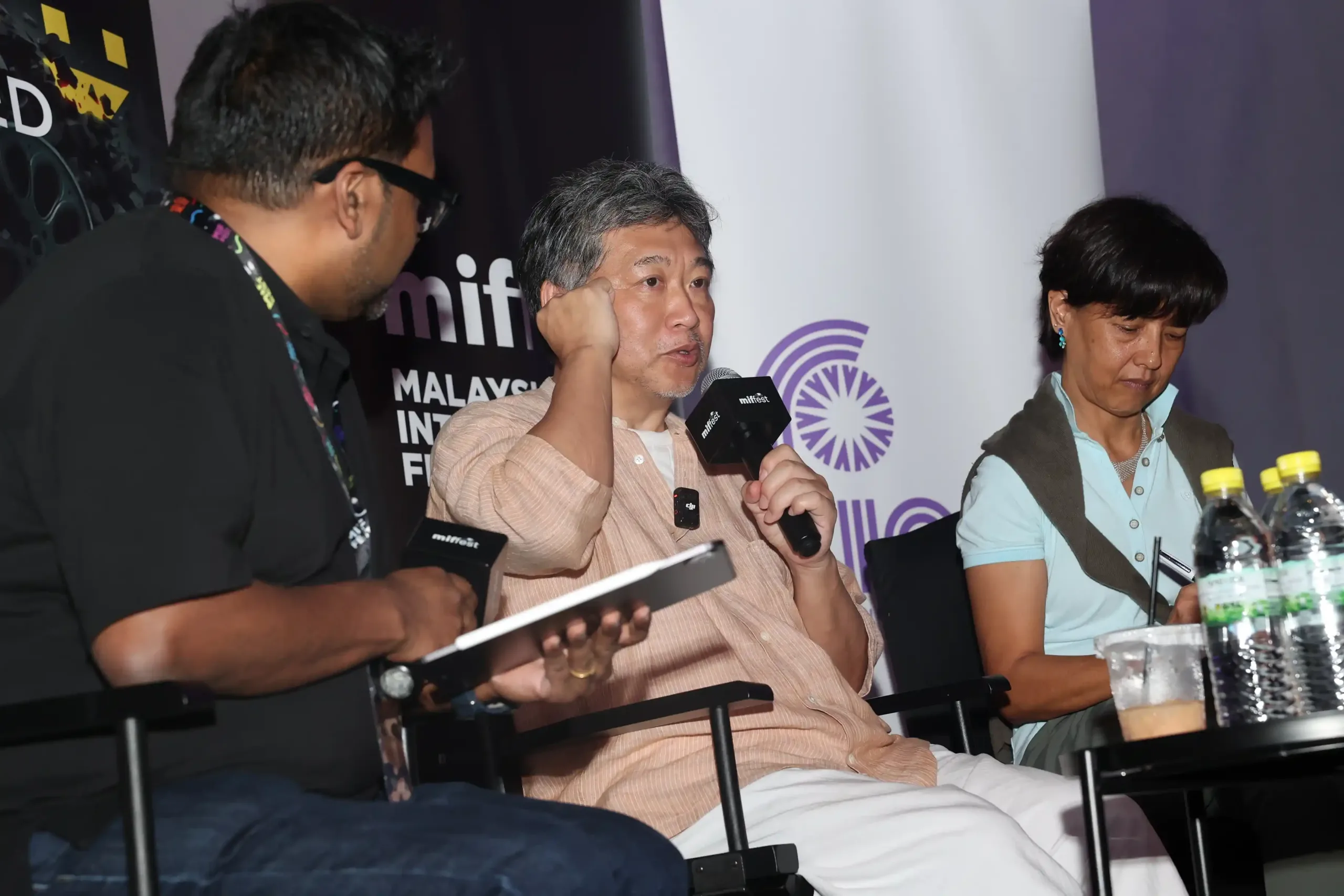
Umapagan Ampikaipakan and Hirokazu Kore-eda.
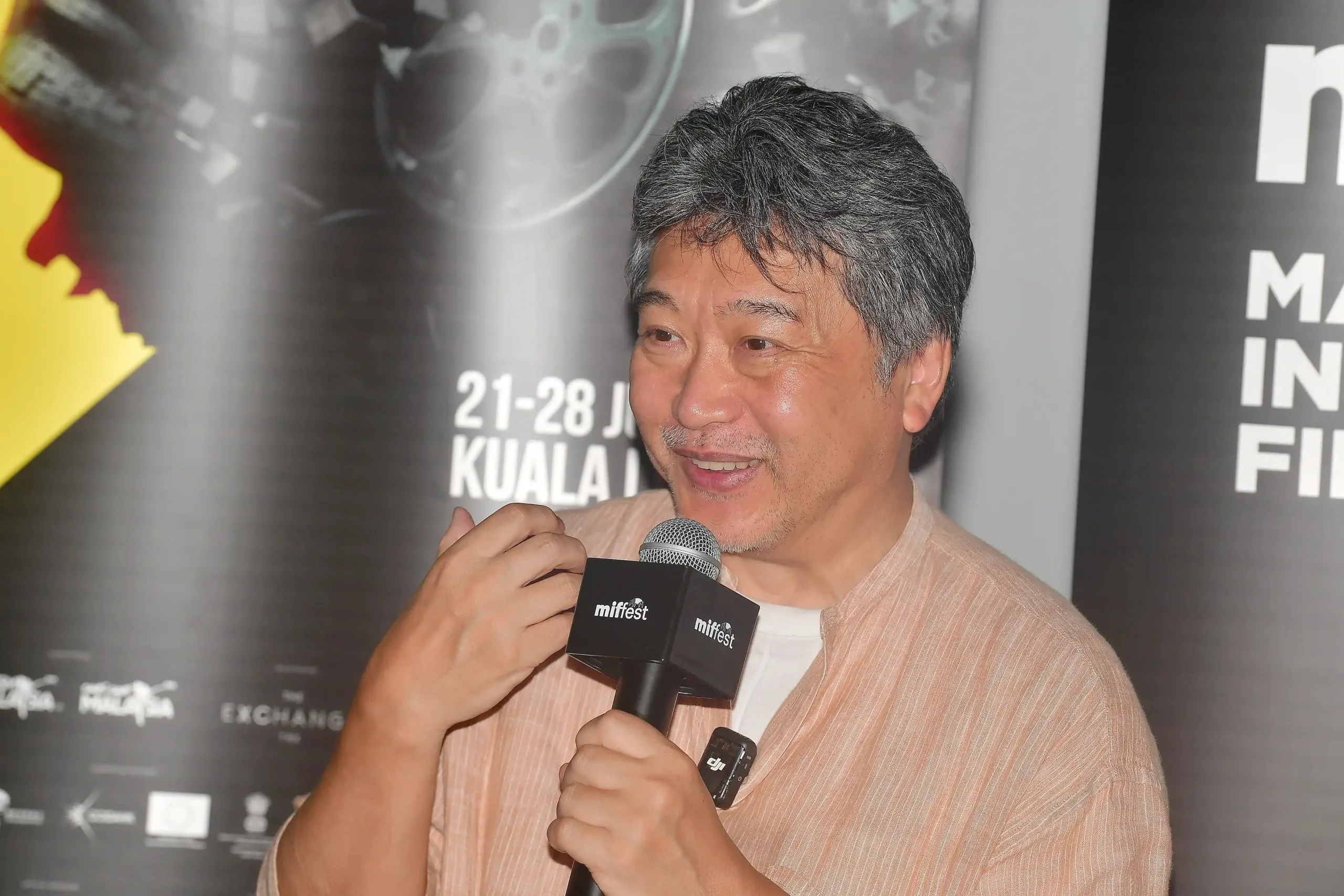
Hirokazu Kore-eda
Shomin-geki (Shoshimin-eiga) and the Beauty of the Mundane
Though often associated with the “shomin-geki” style—focused on the everyday lives of ordinary people—Kore-eda himself does not use this term, which is more commonly applied by foreign critics. Nevertheless, his films consistently explore the quiet beauty of mundane moments. Kore-eda likens his storytelling to weaving a piece of textile, where vertical threads represent the main narrative, while horizontal threads are the seemingly small, yet significant moments that give the story depth. This attention to the ordinary, from family meals to casual conversations, is what makes his films resonate deeply with viewers.
Originality Rooted in Personal Passion
When asked about how he maintains originality in his work, Kore-eda offers a humble yet profound answer: he doesn’t consciously try to be different. Instead, he focuses on stories and themes that genuinely interest him, trusting that this personal passion will translate into originality on screen. This approach has allowed Kore-eda to create a diverse body of work that, while distinct in its themes, remains united by his deep empathy for human emotions and relationships.
Adapting Manga: Staying True to the Essence
Kore-eda has successfully adapted popular manga into films and TV shows, such as “Our Little Sister” and “The Makanai: Cooking for the Maiko House”. When adapting these stories, Kore-eda aims to preserve the essence of the original work, even if it requires significant changes to the structure. For instance, in “Our Little Sister”, Kore-eda chose to focus on the unseen presence of the father, believing that his absence spoke volumes about the impact he had on the lives of his daughters. This subtlety is a hallmark of Kore-eda’s adaptation style, where he remains faithful to the emotional core of the original material while making it uniquely his own.
The Future: Exploring New Genres
While Kore-eda is best known for his human dramas, he expressed interest in exploring genre films, particularly action or horror, in future projects. He believes that genre films can transcend language barriers more easily, allowing him to reach broader audiences. However, Kore-eda is clear that any such foray would still maintain his commitment to character-driven storytelling.
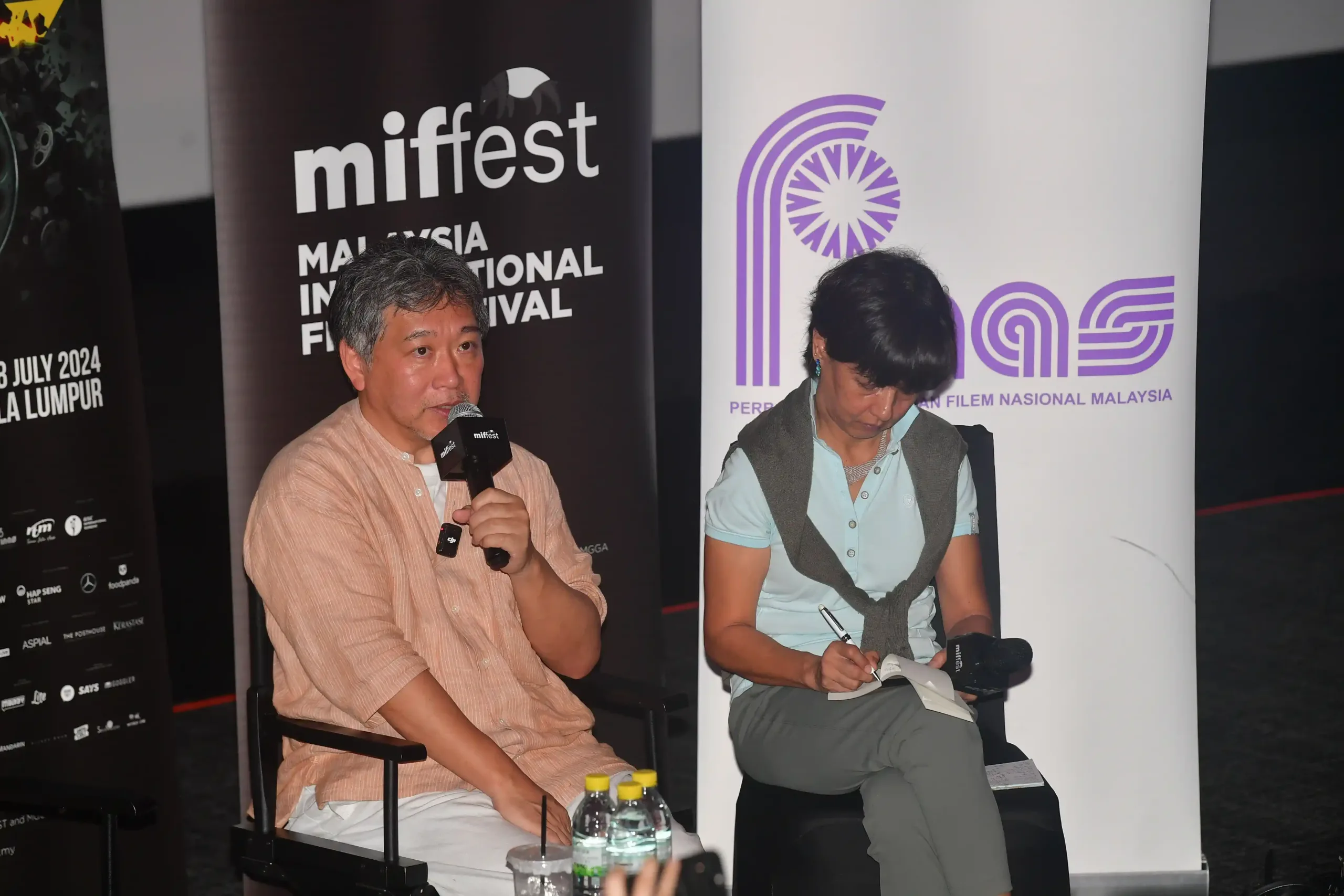
Hirokazu Kore-eda and his interpreter
Hirokazu Kore-eda’s masterclass provided a deep dive into the mind of a filmmaker who has consistently pushed the boundaries of storytelling while staying true to the emotional core of his characters. His films, whether set in Japan, Korea, or France, explore universal themes of family, identity, and the passage of time. As he continues to evolve as a director, Kore-eda remains committed to crafting stories that resonate on a deeply human level, transcending cultural and linguistic boundaries.









